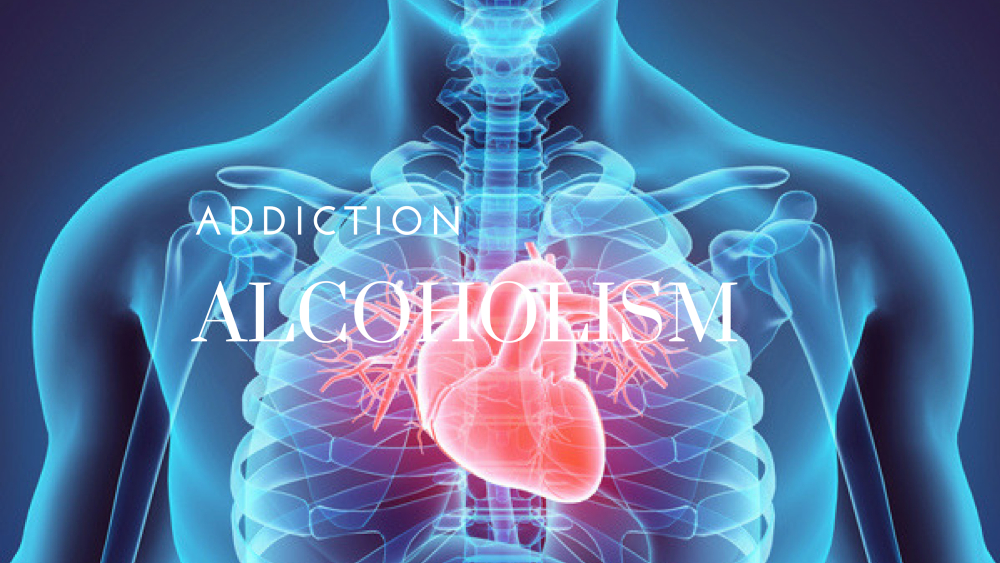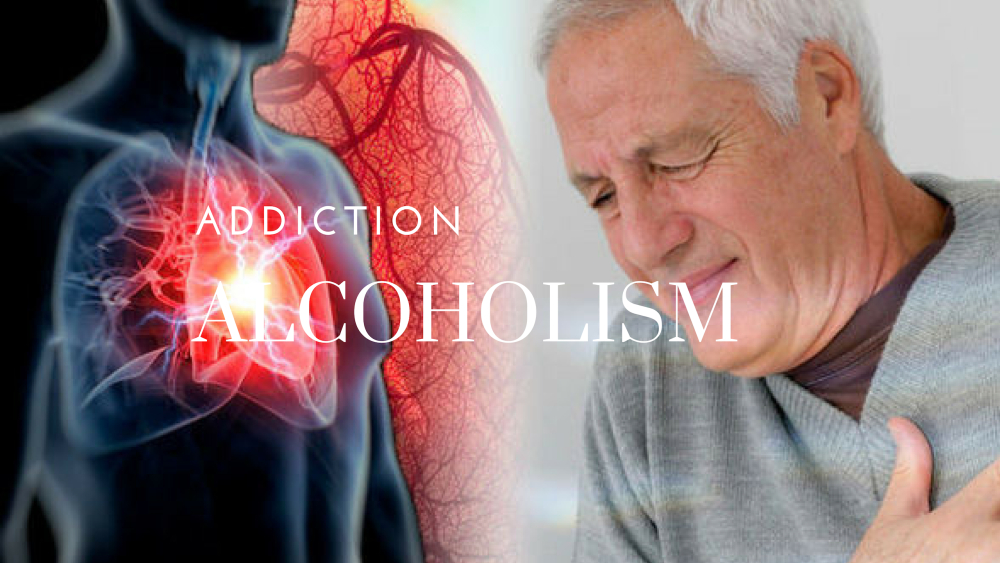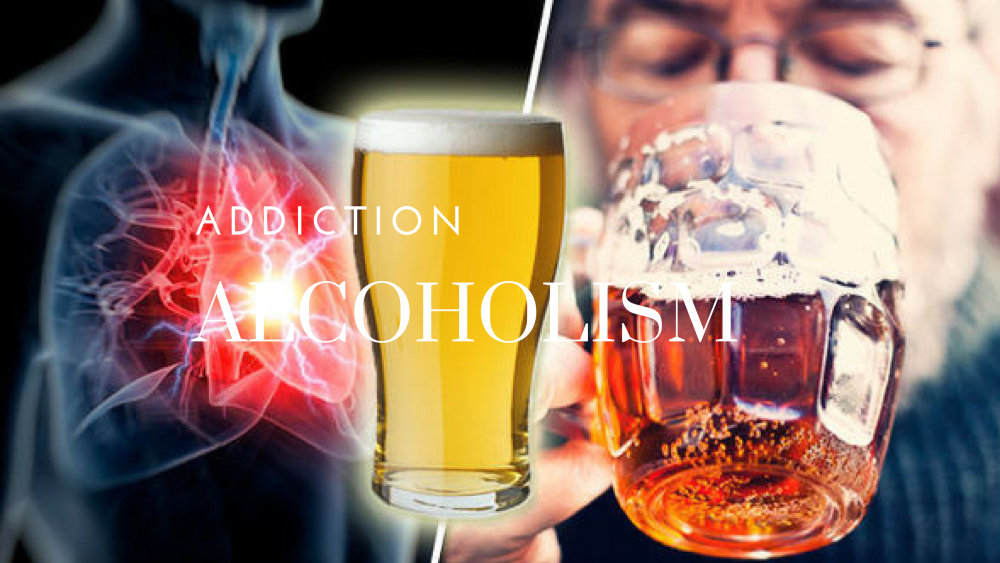
Heart failure (HF) has continued to be an issue of great concern in public health. An estimated 5000, 000 US citizens are diagnosed with HF every year.
This is despite all the gains made in medical and surgical interventions for HF. Mortality rates are still alarmingly high underscoring the need for primary prevention as the first course of action. And among other lifestyle changes, alcohol seems to play a major role in HF today in the US.
Heart failure affects over 5 million people in the US alone. HF exerts a high societal burden. Even though in the last two decades, there has been a stable frequency rate of HF incidences, death mortality after onset of HF remains alarmingly high. A large body of evidence backs the association between alcohol consumption and heart attacks (myocardial infarction (MI)), type 2 diabetes mellitus and hypertension. These three conditions also happen to be key predictors of the onset of HF.
Consequently, heavy drinking is associated with increased risk of HF, whereas light to moderate drinking (equal to 1 drink per day for women and 2 drinks per day for men) has been linked to lower risk of HF.
Because of the increasingly high mortality rates associated with HF, it then becomes important to focus on precautionary measures that could significantly lower the occurrence of HF.
Reports indicate a link between light to moderate drinking, heavy drinking, drinking patterns, types of alcohol and HF. In addition, studies show primary physiologic mechanisms and the likely role genetic factors play that influence alcohol absorption.
Nevertheless, while excessive consumption of alcohol can trigger heart diseases such as alcoholic cardiomyopathy that can lead to HF, light to moderate drinking may actually benefit the heart. Recent studies have suggested that alcohol and heart failures sometimes goes beyond just taking alcohol. Factors such as quantity, drinking patterns and even genetics play a role in how our bodies react to alcohol.
Let us plunge in and review the evidence available associating alcohol consumption and HF, the effects alcohol has on the heart and consider the risks as well as potential benefits according to some researchers. Let’s debunk the myths around alcohol consumption and give you the facts on alcohol and the heart.
What is Heart Disease?

Your heart is a pump that keeps blood in constant circulation around your body. This ensures that oxygen and nutrients are delivered to all the parts of your body and at the same time carbon dioxide and waste products are carried away from the body.
When our heart or any parts of it like the arteries, veins or your other blood vessels are not working at par, or are altogether damaged, it affects the hearts pumping system. These complications and glitches are what are known collectively as cardiovascular disease that may lead to HF. These cardiovascular diseases cause an estimated 150,000 deaths every year.
Prolonged and excessive drinking of alcohol increases the chances of you developing cardiovascular disease. Drinking within the recommended guidlines for drinking will help keep these risks at a lower level.
There are a variety of heart diseases. The most common among them is Coronary heart disease which can cause a heart attack that can result in death.
What is a Heart Attack?
The most common outcomes of coronary heart disease are heart attacks and chest pains (angina). A heart attack occurs when coronary arteries become blocked, causing blood to stop flowing to the heart’s muscles, effectively cutting oxygen supply to the heart. Without oxygen, the heart cannot function properly. This damage to the heart means your heart can no longer pump blood around your body as it should. As a result, symptoms such as swelling of the ankles and shortness of breath arise which drastically affects the quality of your life. If not managed, this condition progressively worsens, and in the worst case scenario, the heart stops beating altogether, resulting in death.
Coronary heart disease causes an estimated 800 million deaths worldwide. Unfortunately, there isn’t a cure for heart attacks; however there are prescription drugs that can aid in limiting the impact of HF.
Drinking more alcohol than the recommended CMOs’ drinking guidelines can result in high blood pressure and abnormal heart rhythms. Other diseases also arise from heart complications including, liver problems, stroke, and some cancers.
Effects of Alcohol on the Heart

Moderate Consumption
Studies continue to show the link between moderate drinking and risk of HF.
Most findings are showing surprisingly consistent possible benefits of moderate drinking on the risk of HF, but death upon the onset of HF.
A study done by Framingham Heart Study revealed that men who consumed 8 to 14 drinks per week have a 59% lower risk of developing HF compared with abstainers. This study revealed similar results in women with statistically, a significantly lower difference.
Yet another study, the Cardiovascular Health Study, revealed that older adults aged over 65 years, who consumed 7 to 13 drinks per week stood a 34% lower risk of HF.
Light to moderate alcohol use was associated with 40% to 50% lower risk of HF with previous heart attack incident. The findings however further revealed that the risk of HF without a previous heart attack incident among heavy drinkers was almost doubled than in abstainers. Still, there were possible beneficial effects to drinking alcohol moderately.
Therefore, to experience any health benefits from alcohol, keep your consumption light or moderate. Heavy drinking raises a whole new spectrum of likely health problems like peptic ulcers, liver disease, some cancers, among others. Regular or high alcohol use can damage your heart, leading to diseases of the heart muscle, known as cardiomyopathy. Regularly drinking alcohol can also raise your blood pressure.
Heavy Consumption
Long-term, heavy drinking can lead to heart disease. Alcohol type notwithstanding, heavy alcohol consumption is linked to alcoholic cardiomyopathy as we have seen.
Alcoholic cardiomyopathy, a heart disease of the muscle, is common among patients with a long history of heavy alcohol consumption, between 5 to 15 years and above. Most studies show that alcoholic patients with HF have had 10 years or more of exposure to heavy drinking. However, even among alcoholic patients, reports suggest that abstaining from alcohol significantly improves their survival with alcoholic cardiomyopathy.
Effects of Heavy Drinking On the Heart
Regularly drinking more than the recommended CMOs’ drinking guidelines, over a prolonged period increases your risk of developing heart disease. It increases your blood pressure which is one of the greatest risks that can cause a heart attack or a stroke.
Binge drinking also weakens the heart muscle. This hinders the heart from pumping blood as efficiently as it should, leading to cardiomyopathy. This leads to HF which can end in death.
‘Holiday Heart’ Syndrome gets its name from the increased cases of the condition around holiday times or after weekends, when more people are inclined to drink more. People feel like they are having a heart attack which characteristically causes severe pain in the center of the chest.
Holiday Heart Syndrome tends to occur after incidents of heavy drinking, especially those that occur with a 24 hour period – with people drinking at least 15 units (an estimated seven and a half pints of beer or in the case of wine, one and a half bottles) of alcohol. When this occurs, the heart starts beating erratically causing breathlessness and anxiety attacks. The blood pressure then increases; and with it an increased risk of getting a heart attack or even sudden death.
Heavy consumption of alcohol can make your heart beat irregularly. Binge drinking- four or more drinks for women and five or more drinks for men in about 2 hours – can trigger irregular heart rhythms called arrhythmias. This shows that it doesn’t make you any safer if you abstain from alcohol the whole week, and only to binge on the weekend.
HF and Alcohol Drinking Patterns, and Other Modifiers
Distribution
Recent data submitted that drinking patterns play a significant role in the link between alcohol consumption and cardiovascular disease. Binge drinking, which can be defined as drinking of 3 or more alcoholic drinks within 1 to 2 hours, has adverse health effects on the heart. Light to moderate alcohol though, spread over a number of days of the week seems to produce most of the beneficial health effects.
In other words, it is far much better to evenly distribute a certain volume of alcohol within moderate-drinking range throughout the week than to drink an equal volume within 2 to 3 days.
Genes
Several genes appear to play a significant role in alcohol metabolism. Previous reports indicate that the alcohol dehydrogenase 1C (ADH1C) gene plays a key role in alcohol metabolism and heart attack.
Understanding these genetic modifiers in relation to alcohol consumption and HF is important because then it is easy to identify a group of the population that is more likely to benefit from moderate drinking. Equally, knowledge about such genetic variations can help identify people at risk for alcoholic cardiomyopathy. These people (and possibly their subsequent generations) can then be advised or they themselves can choose to abstain from alcohol.
Types of Drinks and their Effects on the Heart
Unfortunately, very few studies have delved into the association between beverage types and the risk of HF. Research reports suggest inverse associations or lack thereof of association between wine, beer and spirits and HF risk.
Wine

It is widely known and even some experts have suggested that wine may actually offer additional health benefits. Still, findings of the link between beverage types and cardiovascular disease remain inconclusive. More research is still required to show whether drinking red wine is really good for the heart.
Studies suggest that that antioxidants help to prevent thrombosis (blood clot in the blood vessels). Red wine is rich in antioxidant ingredients called flavonoids. White alcoholic drinks, like cider and vodka, contain the least concentration of flavonoids. However, other alcohols, such as beer, have nearly the same antioxidant levels as red wine.
Much of the attention given to red wine comes from observing the French. They have long been known to love their red wine, and they indulge accordingly. Yet, they have healthy hearts even with typically high-fat food diets. Furthermore, studies reveal that people who drink wine over other types of alcohol tend to generally live healthier, drink less, smoke less and have a healthier diet. This also suggests that maybe these other factors, rather than the red wine, are in fact responsible for their good health.
Beer

Beer has some effects that could lower the risk of major risk factors for HF, including heart attack and type 2 diabetes mellitus. Several studies have linked a lower risk of diabetes mellitus and heart attack with light to moderate alcohol consumption. Overall, moderate drinking of alcohol may lower the risk of HF.
Can Alcohol Have Any Benefits For Your Heart?
Can a few alcoholic drinks really be beneficial to your heart? Yes, but only a few, and not everyone.
Moderate drinking (one drink a day for women and two for men) seems to protect some people against heart disease. Alcohol may help your heart in the following ways:
- It helps prevent damage caused by high Low Density Cholesterol (LDL), aka “bad” cholesterol.
- It raises High Density cholesterol (HDL) aka “good” cholesterol.
- It stops blood from clotting, thus it may delay impending heart attacks. But the flip side is it could make one bleed more easily.
- Research has shown that small amounts of alcohol can have a protective effect on your heart. However, this benefit seems to be restricted to women over 45 years old drinking well within the stipulated CMOs’ low risk drinking guidelines.
- Moderate alcohol consumption prevents artery damage. Alcohol seems to increase the level of ‘good’ cholesterol (HDL) in the blood. This minimizes the amount of fatty deposit on these blood vessels that narrows our arteries and makes them more likely to clog.
- It prevents thrombosis- formation of blood clots along the blood vessels. These blood clots close off the arteries, causing a heart attack. Alcohol decreases the stickiness of platelets so they are less likely to clump together to form clots. Light to moderate amounts of alcohol with a meal can cut the sudden rise of the protein fibrinogen produced by the liver, which is instrumental in clot formation.
But before you jump onto the cocktail bar, it is never a good idea to start drinking alcohol to guard yourself against heart disease. Know this: Doctors and other health experts have not conclusively decided if those healthy effects are as a result of the alcohol or from other good lifestyle choices that light drinkers follow. So if you don’t drink already, your heart is certainly not a reason to start. A healthy diet and regular workouts provide just the same if not better effects as those experienced with alcohol.
You Shouldn’t Be Drinking If…

While many of us enjoy sipping on a glass of wine at dinner or going for the happy hour with our friends, drinking alcohol is still something we have to choose to indulge in carefully. There are many instances when alcohol shouldn’t go anywhere near your mouth, and these go beyond if you have substance abuse issues or just when you’re pregnant.
Alcohol can have devastating effects on our mind and body. In order to be safe and healthy it is best to abstain from drinking altogether in circumstances where that margarita will create more harm than just a hangover.
While alcohol is a depressant, meaning it slows you down – mentally and physically, even a single drink can hamper your reflexes for several hours. Anyone who has had a drink or two knows the instantaneous and observable effects of alcohol, and we are not talking about just clumsiness. Much more can happen inside your body that you may not be apparent to you at the time. And unfortunately, these bodily changes can have long-term and serious effects on you and the quality of your life and others.
It is therefore essential to know when to take a break or stop altogether. Talk to your doctor if you have one of these illnesses/conditions and you are not sure whether you should be drinking in the first place. Alcohol can be harmful for some people who have the following conditions.
- A history of alcoholism (These should not drink!)
- A history of strokes
- Cardiomyopathy
- Diabetes
- Heart failure
- High blood pressure
- High triglycerides
- Irregular heart rhythm
- Pregnant women
Some medications don’t go well with alcohol. Mixing antibiotics and alcohol is a big no-no, as it can pose the risk of side effects from both the alcohol and the medication. Drinking alcohol while on medication like metronidazole can cause nasty side effects, including nausea, vomiting, flushing, and increased heart rate. These drugs often come with a warning sticker from the pharmacy clearly labeled or that tells you not to drink while you are on them. Always check with your pharmacist if you are not certain about your medicine.
Alcohol should be avoided if you are ailing from any of the neurological diseases or other chronic diseases such as anxiety, depression or cancer. Drinking can make your anxiety or depression worse.
Alcohol should never be drunk as a coping mechanism. It should especially be drunk with caution by those with alcoholism in their family history as it may lead to dependency and addiction.
Avoid that mid-flight glass of alcohol while flying if you want to minimize the effect of jet lag. Drinking excess alcohol can cause dehydration, as if the conditions in the cabin with lack of humidity and altitude are already not dehydrating enough! You will definitely experience effects of alcohol sooner while flying.
Avoid when alcohol when you’ve taken prescribed sedatives such as Valium or Xanax as these will directly affect your heart. Alcohol greatly magnifies the effects of these sedative effects, causing severe drowsiness, respiratory cardiac depression or even death.
Avoid alcohol when you’re focusing on reaching a fitness goal like training for a marathon or simply boosting your fitness levels. Drinking alcohol can lead to additional calorie intake and impede performance. With impaired senses caused by alcohol, you may be tempted to overeat thus pile up on the calories. Excessive drinking may give you a hangover that may very well tempt you to skip the gym the next day.
Avoid alcohol when you’re trying to get pregnant. Trying to conceive can get stressful at times, especially if you have been trying for long without success. You want to increase your chances of not just getting pregnant, but also having a healthy baby. Although the research on how low to moderate drinking affects women’s fertility is not conclusive, there’s sufficient evidence showing that heavy drinking affects women’s fertility, thus increasing the duration it may have taken to conceive.
Conclusions
Epidemiologic studies (study of diseases) have consistently shown the harmful health effects of heavy drinking. Others studies also point to lower risks of HF with light to moderate consumption of alcohol. However, to fully comprehend the relation between light to moderate drinking and HF, a few gaps need to be filled, especially in light of the role of beverage types, the effects of light-to-moderate drinking, drinking patterns and genetic variations determining alcohol digestion, in predicting co-morbidity and mortality amongst individuals with HF.
In regards to the connection between moderate alcohol consumption and HF, to people who do not consume any alcohol, it would be impulsive to recommend light to moderate drinking as a means to lower the risk of HF; given the possible risk of abuse and subsequent outcomes. This is despite the connection we have seen on lower risk of HF among individuals consuming moderate amounts of alcohol. The maxim better safe than sorry couldn’t be truer in this case.
Contact your GP to help you decide if you should make any adjustments in your drinking, and get assistance of any kind and advice along the way.